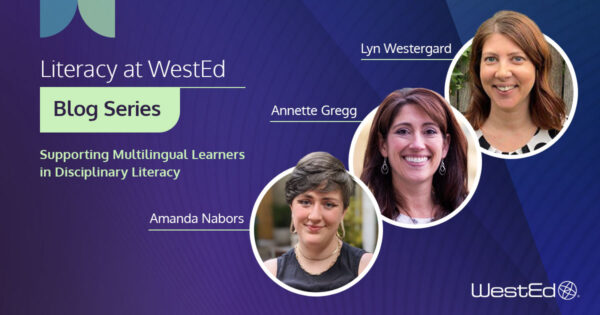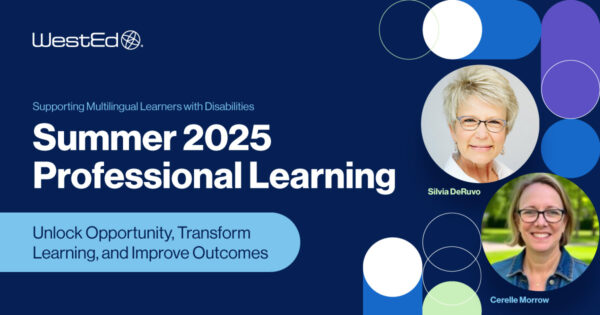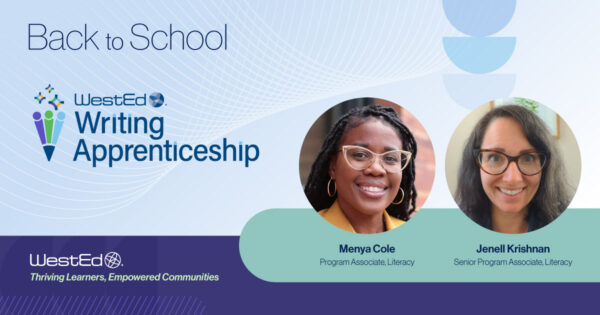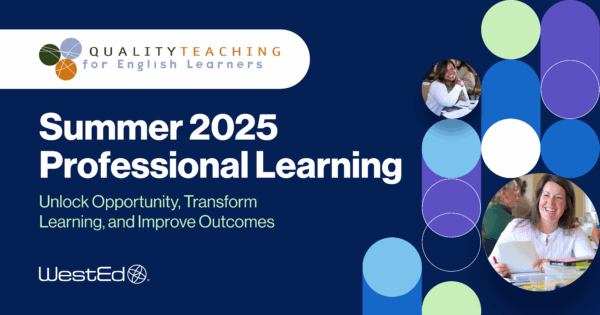
June 4, 2025
Today’s students encounter a greater variety of texts (written, visual, or digital materials that convey information, ideas, or messages) than ever before. Alongside the academic texts they study at school, they also engage daily with personal texts such as group chats, social media, and artificial intelligence tools like ChatGPT. At a time when reading scores nationwide remain alarmingly low, how can educators help develop students’ reading abilities so that they can engage critically with challenging texts?
Enter disciplinary literacy—the specialized ways of reading, writing, and thinking that are unique to each academic subject. Disciplinary literacy equips students to think like experts in each field, helping them understand challenging texts, problems, and questions the way experts would.
With an emphasis on disciplinary literacy, Reading Apprenticeship is a professional development model and instructional approach designed to improve literacy for middle school, high school, and college students. Independent studies show that participation in Reading Apprenticeship shifts teacher practice and improves student learning and engagement.
This year, Reading Apprenticeship is offering summer institutes for educators seeking to improve reading instruction for their disciplines. In this Q&A, WestEd literacy experts Misty Sailors and Heather Howlett discuss how Reading Apprenticeship supports teachers and students in teaching and learning to read through disciplinary literacy and beyond.
Sailors serves as the interim Literacy Director at WestEd, while Howlett is the Director of Professional Learning in Literacy at WestEd.
Note: This conversation has been edited for clarity and length.
While there are many general reading skills that can be applied when reading complex texts in the content areas (e.g., math, science, social studies, language arts, career and technical education), students often struggle to transfer these general skills to the specific demands of different subjects. Disciplinary literacy (subject-specific literacy skills) aims to solve this by focusing on the unique ways of reading, writing, and thinking required in each discipline.
Reading Apprenticeship addresses these challenges by helping students develop subject-specific literacy skills while their teachers are using High Quality Instructional Materials (HQIM). It encourages students to think about their own thinking while they are reading (metacognition) and provides strategies tailored to the literacy demands of each subject. This approach helps students become more engaged and proficient readers in all content areas.
For example, Reading Apprenticeship has addressed disciplinary literacy challenges in Rich Township High School District 227 in Cook County, IL. Students showed marked progress in academic language use, text-based dialogue, reading, and writing benchmarks, achieving a 17 percent increase in PSAT 9 scores. Additionally, 87 percent of students reached or exceeded expected growth, reflecting enhanced persistence and problem-solving skills with challenging texts.
Reading Apprenticeship introduces techniques like metacognitive conversations, in which students talk about their thought processes while reading, and “think-alouds,” in which teachers model their own ways of processing texts. Teacher “think-alouds” are an important part of making visible the processing that they (as expert readers in their discipline) use. Reading Apprenticeship also emphasizes collaborative learning, in which students work together to understand texts, and integrates cognitive and knowledge-building aspects of learning.
Research shows that students in classrooms where Reading Apprenticeship is implemented are more confident readers and are more willing to participate in class discussions. Research also shows that students in Reading Apprenticeship classrooms perform better in both content learning and literacy assessments. Routines introduced by Reading Apprenticeship enhance student reading comprehension, engagement, and academic success across various subjects. Students think and talk about how they learn as well as what they learn.
Reading Apprenticeship helps educators by offering professional learning focused on modeling discipline-specific literacy skills and establishing routines for student discussion and collaboration. This approach allows teachers to pinpoint students’ literacy challenges through ongoing assessment and reflection and to address these challenges with targeted strategies that promote deeper understanding and engagement. In fact, teachers who implement Reading Apprenticeship routines provide more opportunities for students to engage in metacognitive conversations and collaborative practices. Teachers report growing in their confidence as teachers as a result of participating in Reading Apprenticeship professional learning.
Reading Apprenticeship aligns with the Science of Reading by incorporating evidence-based practices that support foundational and advanced reading skills. The program integrates systematic instruction in advanced word recognition, morphology, and vocabulary with strategies for reading comprehension that are specific to different subjects. This approach ensures that students build essential skills for fluency and stamina while also learning to engage with complex texts across various content areas.
Additionally, Reading Apprenticeship emphasizes metacognitive strategies, in which students reflect on their thinking processes, and collaborative learning, which helps students develop a deeper understanding of texts. These practices are in line with the Science of Reading’s focus on explicit, systematic instruction and the development of skilled readers through a structured progression of reading skills.
The program also addresses oral reading fluency, silent reading fluency, syntax, and the unique challenges of reading disciplinary texts. By integrating these elements, Reading Apprenticeship provides a comprehensive framework that supports students in becoming proficient readers across all content areas.
Educators have access to ongoing support and resources like coaching, professional learning communities, and leadership development programs. These resources help teachers deepen their practice, sustain implementation efforts, and collaborate with peers to continuously improve their instructional strategies.
Reading Apprenticeship supports Multilingual Learners by providing a flexible framework that accommodates diverse linguistic backgrounds and promotes inclusive instructional practices. It emphasizes using students’ background knowledge and experiences, collaborative learning, and scaffolding techniques to ensure Multilingual Learners can access and engage with academic content.
Get Started With Reading Apprenticeship Summer Professional Learning
Are you excited to transform your school’s or district’s literacy practices? Join us this summer for an opportunity to learn how to enhance student engagement and success across disciplines.
Visit our Summer Learning page for details about our in-person and online offerings.
You can also contact our team today to speak with a Reading Apprenticeship expert.
Misty Sailors is the interim Literacy director at WestEd. With over 30 years of experience in literacy education and research, Sailors is passionate about empowering educators to provide high-quality educational opportunities for all students and guiding educators to implement evidence-based literacy instruction.
Heather Howlett is the director of Professional Learning in Literacy at WestEd. Howlett designs and facilitates Reading Apprenticeship professional learning and collaborates with schools and districts to assess their literacy needs and plan for implementation of Reading Apprenticeship services.










